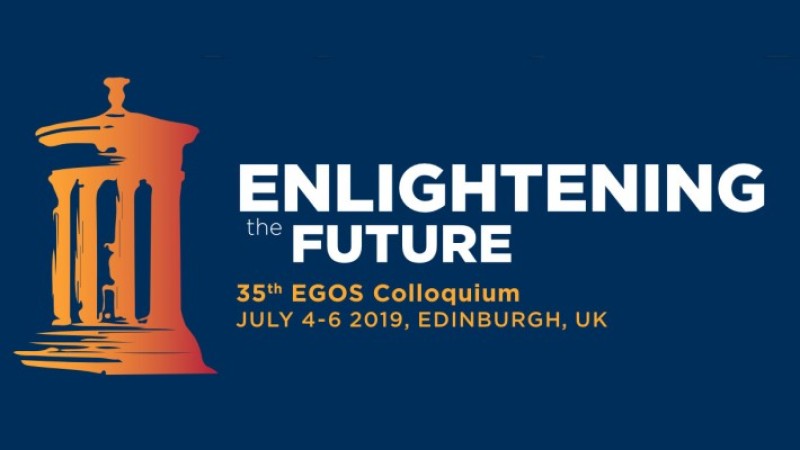Sub-theme 57: Organizational Fields of the Future and the Future of Fields
Call for Papers
This sub-theme focuses on new research developments on organizational fields and how field-level approaches can help address
new societal challenges and opportunities. Although the field concept has long been at the core of organization theory (e.g.
DiMaggio & Powell, 1983; Zietsma et al., 2017), it is even more useful now as boundaries between sectors and social spheres
have blurred.
We believe that field approaches hold promise to capture three developments that are key for
contemporary organizations and societies today:
Cross-field interactions, which are the informal interactions increasingly happening in virtual and physical interstitial spaces between fields (Furnari, 2014), such as social media, inter-industry maker-spaces, fab labs and co-working spaces, field-configuring events spanning fields and any other between-fields interaction setting (cf. Hallett & Ventresca, 2006);
Cross-field intersections, which are the more formalized and structural arrangements that govern resources and shared issues between fields (Zietsma et al., 2017), such as boundary organizations (e.g. O’Mahony & Bechky, 2008), hybrid organizations (e.g. Battilana et al., 2017), digital platforms and other types of structural overlaps between fields (e.g. Furnari, 2016; Evans & Kay, 2008);
Cross-field interfaces, which are the communication protocols that affect interactions among actors between fields, such as micro-level framing and meaning-making processes (e.g., Gray et al., 2015; Leibel et al., 2018), interaction rituals (Collins, 2004), shared vocabularies of practice (e.g., Loewenstein et al., 2015), category-related processes (Wry et al., 2014), boundary-shaping processes (e.g. Grodal, 2017).
Cross-fields phenomena have serious consequences for organizing
today, as is demonstrated by the power of monopolistic digital platforms (e.g., Srnicek, 2017), the diffusion of new forms
of cross-sector hybrid collaboration (e.g., Battilana et al., 2017), and the emergence of new fields from initially inconsequential
social interactions between fields. To explain the “fields of the future”, we must better understand cross-field phenomena
and processes.
We invite papers that expand the frontiers of organizational field research and address (but
are not limited to) the following research questions:
What are the different ways in which multiple organizational fields interact and what are the consequences? How can we conceptualize various field-to-field interactions?
How can field boundaries be defined? Changed? What are the consequences?
What new forms of cross-field interaction are emerging due to industry convergence, cultural and institutional shifts, or the recognition of interdependencies in addressing societal problems? What are the consequences of these cross-field interactions for the emergence, evolution, fracturing, or crystallization of organizational fields?
What is the (so far under-theorized) role of digital technologies and platforms to explain within-field and inter-field phenomena? How is power and responsibility redistributed?
How can the intersections between fields be managed by different organizational forms (digital platforms, hybrid organizations, boundary organizations, etc.)? What are the consequences of these forms for emergence and change in the fields that they bridge?
We welcome papers that use any qualitative, quantitative, or mixed method. We also encourage novel methods to the study
of fields such as fuzzy-set/qualitative comparative analysis, topic modelling, lattice analysis, and different types of relational
methods (e.g. Oberg et al., 2017; Jancsary et al., 2018). Theoretically, we also welcome papers from different theoretical
perspectives in addition to institutional theory and field theory at large.
References
- Battilana, J., Besharov, M., & Mitzinneck, B. (2017): “On Hybrids and Hybrid Organizing: A Review and Roadmap for Future Research.” In: R. Greenwood, C. Oliver, T.B. Lawrence & R.E. Meyer (eds.): The SAGE Handbook of Organizational Institutionalism, 2nd ed. London: SAGE Publications, 133–169.
- Collins, R. (2004): Interaction Ritual Chains. Princeton: Princeton University Press.
- DiMaggio, P.J., & Powell, W.W. (1983): “The Iron Cage Revisited: Institutional Isomorphism and Collective Rationality in Organizational Fields.” American Sociological Review, 48, 147–160.
- Evans, R., & Kay, T. (2008): “How Environmentalists ‘Greened’ Trade Policy: Strategic Action and the Architecture of Field Overlap.” American Sociological Review, 73 (6), 970–991.
- Furnari, S. (2014): “Interstitial spaces: Microinteraction settings and the genesis of new practices between institutional fields.” Academy of Management Review, 39 (4), 439–462.
- Furnari, S. (2016): “Institutional fields as linked arenas: Inter-field resource dependence, institutional work and institutional change.” Human Relations, 69 (3), 551–580.
- Gray, B., Purdy, J.M., & Ansari, S. (2015): “From interactions to institutions: Microprocesses of framing and mechanisms for the structuring of institutional fields.” Academy of Management Review, 40 (1), 115–143.
- Grodal, S. (2017): “Field Expansion and Contraction: How Communities Shape Social and Symbolic Boundaries.” Administrative Science Quarterly, first published online on November 27, 2017, http://journals.sagepub.com/doi/10.1177/0001839217744555
- Hallett, T., & Ventresca, M.J. (2006): “Inhabited institutions: Social interactions and organizational forms in Gouldner’s Patterns of Industrial Bureaucracy.” Theory and Society, 35 (2), 213–236.
- Jancsary, D., Meyer, R.E., Höllerer, M.A., & Barberio, V. (2018): “Toward a Structural Model of Organizational-Level Institutional Pluralism and Logic Interconnectedness.” Organization Science, 28 (6), 1150–1167.
- Leibel, E., Hallett, T., & Bechky, B. (2018): “Meaning at the source: The dynamics of field formation in institutional research.” Academy of Management Annals, 12 (1), 154–177.
- Loewenstein, J., Ocasio, W., & Jones, C. (2012): “Vocabularies and vocabulary structure: A new approach linking categories, practices, and institutions.” Academy of Management Annals, 6 (1), 41–86.
- Oberg, A., Korff, V.P., & Powell, W.W. (2017): “Culture and Connectivity Intertwined: Visualizing Organizational Fields as Relational Structures and Meaning Systems.” Research in the Sociology of Organizations, 53, 17–47.
- O’Mahony, S., & Bechky, B.A. (2008): “Boundary organizations: Enabling collaboration among unexpected allies.” Administrative Science Quarterly, 53 (3), 422–459.
- Srnicek, N. (2017): Platform Capitalism. Cambridge: Polity Press.
- Wry, T., Lounsbury, M., & Jennings, P.D. (2014): “Hybrid vigor: Securing venture capital by spanning categories in nanotechnology.” Academy of Management Journal, 57 (5), 1309–1333.
- Zietsma, C., Groenewegen, P., Logue, D.M., & Hinings, C.R. (2017): “Field or fields? Building the scaffolding for cumulation of research on institutional fields.” Academy of Management Annals, 11 (1), 391–450.


